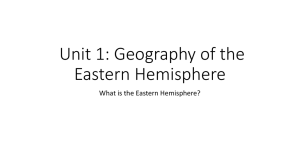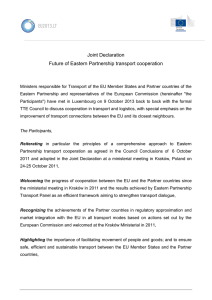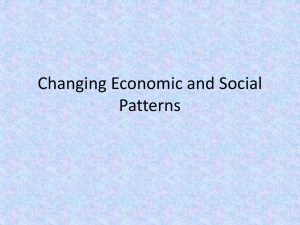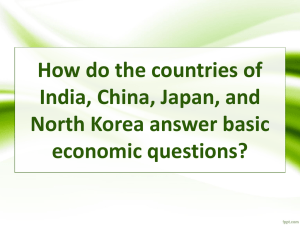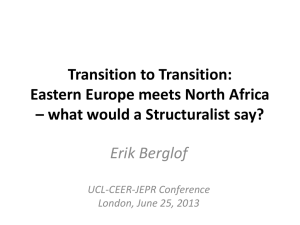joint motion for a resolution
advertisement
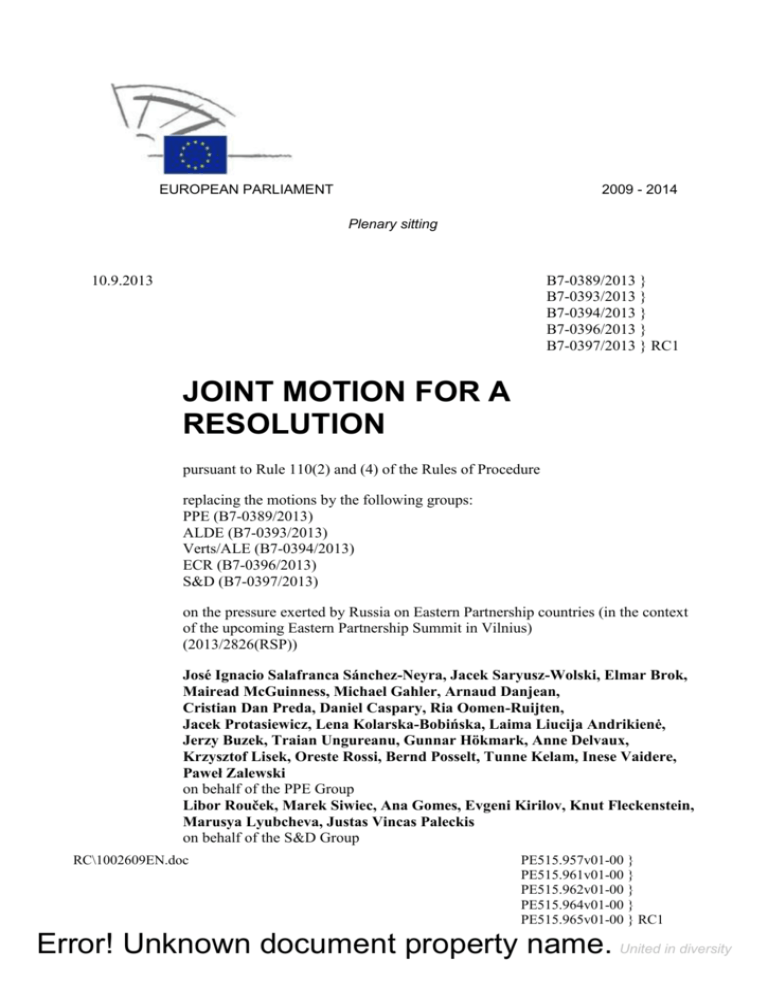
EUROPEAN PARLIAMENT 2009 - 2014 Plenary sitting 10.9.2013 B7-0389/2013 } B7-0393/2013 } B7-0394/2013 } B7-0396/2013 } B7-0397/2013 } RC1 JOINT MOTION FOR A RESOLUTION pursuant to Rule 110(2) and (4) of the Rules of Procedure replacing the motions by the following groups: PPE (B7-0389/2013) ALDE (B7-0393/2013) Verts/ALE (B7-0394/2013) ECR (B7-0396/2013) S&D (B7-0397/2013) on the pressure exerted by Russia on Eastern Partnership countries (in the context of the upcoming Eastern Partnership Summit in Vilnius) (2013/2826(RSP)) José Ignacio Salafranca Sánchez-Neyra, Jacek Saryusz-Wolski, Elmar Brok, Mairead McGuinness, Michael Gahler, Arnaud Danjean, Cristian Dan Preda, Daniel Caspary, Ria Oomen-Ruijten, Jacek Protasiewicz, Lena Kolarska-Bobińska, Laima Liucija Andrikienė, Jerzy Buzek, Traian Ungureanu, Gunnar Hökmark, Anne Delvaux, Krzysztof Lisek, Oreste Rossi, Bernd Posselt, Tunne Kelam, Inese Vaidere, Paweł Zalewski on behalf of the PPE Group Libor Rouček, Marek Siwiec, Ana Gomes, Evgeni Kirilov, Knut Fleckenstein, Marusya Lyubcheva, Justas Vincas Paleckis on behalf of the S&D Group RC\1002609EN.doc PE515.957v01-00 } PE515.961v01-00 } PE515.962v01-00 } PE515.964v01-00 } PE515.965v01-00 } RC1 Error! Unknown document property name. United in diversity Kristiina Ojuland, Graham Watson, Leonidas Donskis, Marietje Schaake, Sarah Ludford, Edward McMillan-Scott, Andrew Duff, Johannes Cornelis van Baalen, Izaskun Bilbao Barandica, Hannu Takkula, Alexander Graf Lambsdorff on behalf of the ALDE Group Werner Schulz, Rebecca Harms on behalf of the Verts/ALE Group Charles Tannock, Ryszard Antoni Legutko, Tomasz Piotr Poręba, Paweł Robert Kowal, Marek Henryk Migalski, Ryszard Czarnecki, Adam Bielan, Valdemar Tomaševski on behalf of the ECR Group RC\1002609EN.doc PE515.957v01-00 } PE515.961v01-00 } PE515.962v01-00 } PE515.964v01-00 } PE515.965v01-00 } RC1 Error! Unknown document property name. European Parliament resolution on the pressure exerted by Russia on Eastern Partnership countries (in the context of the upcoming Eastern Partnership Summit in Vilnius) (2013/2826(RSP)) The European Parliament, – having regard to the Eastern Partnership Summit to be held in Vilnius in November 2013, – having regard to the fact that Ukraine, Armenia, Georgia and Moldova have the prospect of signing or initialling, as the case may be, Association Agreements with the European Union; having regard in particular to the new, enriched character of association that is at stake, offering a broad and deep relationship with European partners, and therefore going well beyond merely economic benefits towards strong political and societal relations, – recalling that the 1994 Budapest Memorandum concerning Ukrainian nuclear disarmament gives Ukraine guarantees against the use or threat of force and provides for support being given to the country should an attempt be made to place pressure on it by economic coercion, – having regard to Rule 110(2) and (4) of its Rules of Procedure, A. whereas continuous engagement within the Eastern Partnership framework has offered partner countries a comprehensive agenda for pursuing reforms that benefit their citizens, while the Association Agreements and Deep and Comprehensive Free Trade Agreements (DCFTAs) between the EU and Eastern Partnership countries are a commitment by the willing and able to strengthen and successfully pursue cooperation between the parties in many areas; B. whereas the Russian pressure most recently faced by Eastern Partnership countries progressing on the road to Association Agreements, including targeted sanctions against Ukraine’s exports, allusions to the possibility of stepping up pressure on Moldova through an export ban on its wine industry, additional obstacles impeding progress towards resolution of the Transnistrian conflict, and security-related threats with respect to Armenia, which are aimed at forcing the Eastern Partnership countries not to sign or initial the Association Agreements or DCFTAs but instead to intensify their cooperation with the Russian-led Customs Union, which Russia intends to transform into a Eurasian Union, has put them in a precarious position as a result of geopolitical constraints to which they should not be subject; C. whereas the type of pressure exerted on Eastern Partnership countries, ranging from current economic and political aspects to the announcement of future economic restrictions, signals Russia’s intention to continue to consider the Eastern Partnership region as its sphere of exclusive influence and oppose the prospect of these countries’ closer integration with the EU via the Association Agreements, an approach which goes against the principles of national sovereignty, mutual trust and good neighbourly relations; D. whereas Eastern Partnership countries have the full sovereign right and freedom to build relations, as equal partners, with partners of their choice, in line with the Helsinki Accords; RC\1002609EN.doc PE515.957v01-00 } PE515.961v01-00 } PE515.962v01-00 } PE515.964v01-00 } PE515.965v01-00 } RC1 Error! Unknown document property name. E. whereas, now more than ever, attention needs to be drawn to the alarming pressures in the EU’s Eastern Neighbourhood and on the Eastern Partnership project itself, which is being contested and questioned by Russia; F. whereas an Association Agreement with the EU entails political and legal reforms conducive to strengthening the rule of law, reducing corruption and securing greater respect for human rights; whereas joining the Customs Union, on the contrary, does not involve any values-based benchmarks or conditionalities, and therefore cannot be considered as an incentive to domestic reform; G. whereas frozen conflicts are repeatedly being used to weaken or undermine the full sovereignty of Eastern Partnership countries in accordance with Russia’s geopolitical and economic interests; 1. Recalls that the principles of equality and respect for the rights inherent in sovereignty, non-intervention in internal affairs, good cooperation among states and the fulfilment in good faith of obligations under international law, as agreed in the framework of the Helsinki Accords, are fundamentals governing international relations among independent states and, as such, should in no way be infringed upon; 2. Deplores the fact that as the Vilnius Eastern Partnership Summit approaches, different types of pressure are mounting on Eastern Partnership countries reaching the final phase of negotiating the signing or initialling of their Association Agreements; regards this pressure as unacceptable; believes, furthermore, that the progressive integration of partner countries with the EU is consistent with their pursuit of good neighbourly relations with Russia, and calls on Russia to refrain from taking any action which is in clear contradiction to the above-mentioned Helsinki principles; calls on the Russian Federation to refrain from exerting more pressure on the Eastern partners and to respect fully their sovereign right to pursue their own political choices; 3. Strongly underlines the fact that the free choices of the Eastern Partnership countries, which do not have any negative impact whatsoever on trade with Russia, should not make them bear consequences such as trade measures, visa restrictions, worker mobility restrictions and interference in frozen conflicts; firmly rejects, moreover, the zero-sum game as a paradigm for EU and Russian relations with the Eastern Partnership countries; 4. Is convinced that further political and economic reform in these countries, based on EU values and standards, is ultimately in Russia’s own interest, as it would expand the zone of stability, prosperity and cooperation along its borders; recalls the EU’s standing invitation for Russia to contribute to this process via constructive engagement with the Eastern Partnership countries; 5. Calls on the Commission and the European External Action Service (EEAS) to consider those developments beyond a purely trade dimension, which is merely a cover for blatant political pressure, and to take action in defence of the Union’s partners, sending a strong message of support for all Eastern Partnership countries in their European aspirations and choices; RC\1002609EN.doc PE515.957v01-00 } PE515.961v01-00 } PE515.962v01-00 } PE515.964v01-00 } PE515.965v01-00 } RC1 Error! Unknown document property name. 6. Reaffirms its strong support for the initialling or signing of the Association Agreements at the Vilnius Summit with those Eastern Partnership countries which are ready and willing to do so, provided that the relevant requirements are met; believes that this will give renewed impetus to gradual integration and a substantial deepening of relations, thereby responding to those countries’ European aspirations; calls, in this context, on the Eastern Partnership countries to continue and step up their efforts to conclude their current work in the run-up to the Summit, and not to succumb to the pressure exerted upon them; 7. Stresses the need for the EU to fulfil its responsibility to engage and to defend those Eastern Partnership countries that have been exposed to Russia’s open, alarming and escalating pressures intended to deter them from entering into association with the EU, and asks the Commission and the Council to come forward with concrete, effective measures to support the partner countries; 8. Recalls that the Association Agreements and DCFTAs are aimed at boosting the competitiveness, economic output and performance of partner countries and of the EU, while at the same time respecting the Eastern Partnership countries’ economic cooperation with Russia in a way that is beneficial to all parties; points out that, as such, the Association Agreements and DCFTAs do not undermine the long-standing trade relations which Eastern Partnership countries maintain in the region; believes that, on the contrary, they should not be seen as incompatible with those trade relations, and that, without prejudice to the obligations stemming from the Association Agreements and DCFTAs, any trade disputes should be resolved in accordance with the rules and obligations laid down in the World Trade Organisation; affirms, furthermore, that the EU is ready to assist Eastern Partnership partners in their integration efforts by supporting the provisional application of the relevant sections of the Association Agreements or DCFTAs upon signature, unfreezing suspended loans and assistance programmes following the signing or initialling of the Association Agreements or DCFTAs, and pursuing visa facilitation measures and the prospect of visa-free travel; 9. Points out that European integration commands majority popular support in the countries awaiting the initialling or signing of Association Agreements; urges the Commission and the EEAS, nonetheless, to step up efforts to promote the visibility of the Eastern Partnership and its benefits among the general public in the partner countries as a way of consolidating the political consensus regarding their European choices; asks that in the short term a broad information and public awareness campaign be developed and launched in the relevant partner countries concerning the nature, benefits and requirements of the Association Agreements; 10. Instructs its President to forward this resolution to the Council, the Commission, the Vice-President of the Commission / High Representative of the Union for Foreign Affairs and Security Policy, the Member States, the governments and parliaments of the Eastern Partnership countries and of the Russian Federation, the Parliamentary Assembly of the Council of Europe and the Organisation for Security and Cooperation in Europe. RC\1002609EN.doc PE515.957v01-00 } PE515.961v01-00 } PE515.962v01-00 } PE515.964v01-00 } PE515.965v01-00 } RC1 Error! Unknown document property name. RC\1002609EN.doc PE515.957v01-00 } PE515.961v01-00 } PE515.962v01-00 } PE515.964v01-00 } PE515.965v01-00 } RC1 Error! Unknown document property name.

